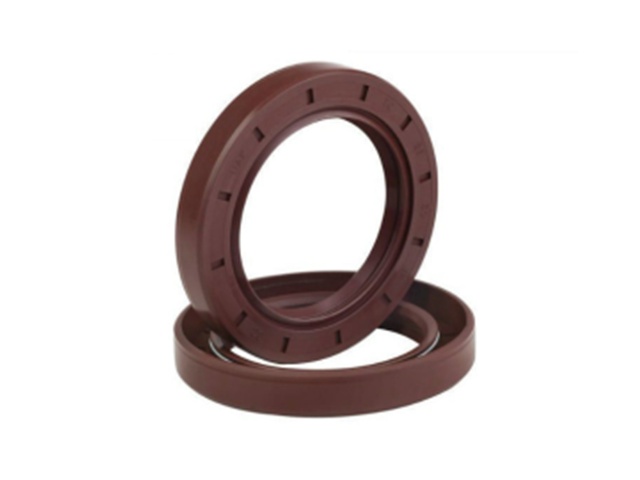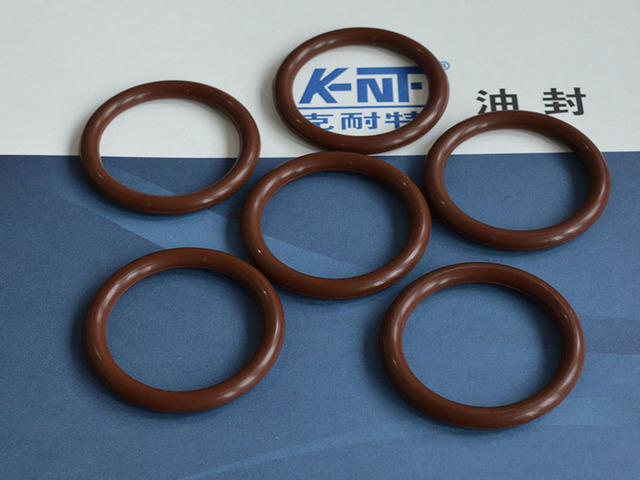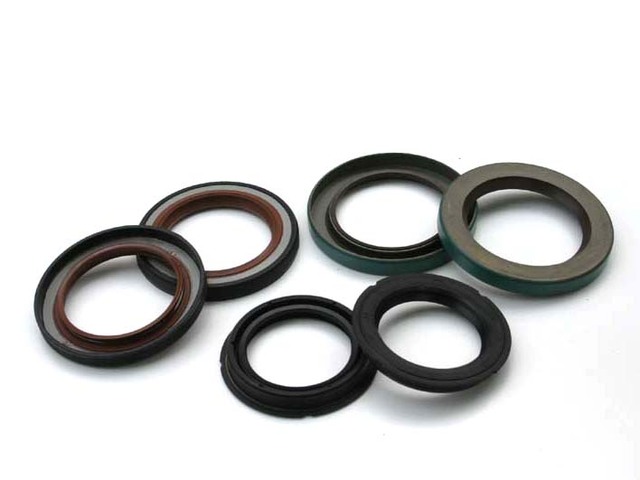A common type of Chinese seal is an oil seal, also known as a rubber seal. Oil seals are used to prevent fluids such as oil or grease from leaking from machinery or equipment. They work by creating a tight seal between two surfaces, preventing liquid from escaping. Oil seals come in many shapes and sizes for many different types of machinery.
The structure of the oil seal is carefully designed to meet the different requirements of different types of machinery. They are usually made of high-quality rubber material, which provides excellent durability, elasticity and resistance to various environmental conditions. The rubber composition ensures that the seal remains flexible and can accommodate the dynamic movements and pressures encountered during mechanical operation.
The versatility of KNT oil seals is reflected in their variety of shapes and sizes tailored to specific applications. They are available in a variety of configurations including cylindrical, radial, axial or flanged designs, each meeting different sealing requirements. Additionally, they can be customized to fit specific equipment or machinery, ensuring a precise fit and optimum sealing performance.
The function of the oil seal is to form a tight and reliable barrier between two surfaces, effectively preventing fluid leakage. They are typically installed in housing units or compartments where rotating or reciprocating parts such as shafts, axles or gearboxes are present. When assembled, oil seals create a physical barrier between rotating parts and the housing, ensuring that lubricants or other fluids remain within the machinery.
The sealing mechanism of an oil seal involves many factors. The primary sealing element is an elastomeric lip, usually made of rubber, that is in contact with the rotating or reciprocating shaft. The lips are precision engineered to maintain proper contact and apply controlled radial pressure to the shaft, effectively creating a seal. This design not only prevents fluid leakage, but also inhibits the ingress of contaminants such as dirt, dust or moisture that could impair the performance of the machinery.
To enhance their sealing capabilities, KNT oil seals can incorporate additional features such as metal reinforcements, garter springs or sealing lips with special contours. These elements provide additional strength, stability and flexibility, further increasing the overall performance and service life of the seal.
If you are in the oil seal market and looking for custom solutions, you are in the right place. With the rise of industrialization, the demand for custom oil seals has been growing rapidly. In this article, we will take you through the process of high quality Oil Seal Chinese Seal Customization, explaining its benefits and considerations.
What is an oil seal
An oil seal, also known as a shaft seal, is a component used to prevent fluid leakage between two moving surfaces, typically in rotating equipment. Oil seals are commonly used in automotive, aerospace and industrial applications to protect bearings, gears and other components from dust, dirt and moisture.
Why choose high quality Oil Seal Chinese Seal Customization
Custom oil seals offer several advantages over standard products. Here are some reasons why you should consider Oil Seal China Seal Customization:
- Tailor-made solutions: provide perfect fit and enhanced performance in meeting the specific needs of your application.
- Improve Efficiency: Minimize friction and wear, thereby increasing efficiency and reducing maintenance costs.
- Cost-effective: More cost-effective than standard products because they reduce the need for costly modifications or replacements.
- Wide range of materials: With high quality Oil Seal Chinese Seal Customization, you can choose from a wide range of materials to meet your specific requirements, such as temperature, pressure and chemical resistance.
High quality Oil Seal Chinese Seal Customization Notes
Before customizing an oil seal, there are some important considerations to keep in mind:
- Application Requirements: The first step in customizing an oil seal China seal is to determine the specific application requirements, such as operating conditions, temperature range, and chemical exposure.
- Material Selection: Once the application requirements are determined, selecting the proper material for the oil seal is critical. Common materials for oil seals include nitrile, silicone, Viton, and polytetrafluoroethylene (PTFE).
- Design considerations: The design of the oil seal should be carefully considered to ensure proper fit, ease of installation and long-term durability.
- Quality Control: It is important to ensure that customized oil seals meet the required quality standards, such as ISO 9001, to ensure consistent performance and reliability.

Oil seal Chinese seal customization process
high quality Oil Seal Chinese Seal Customization includes the following steps:
- Application Evaluation: The first step is to evaluate specific application requirements such as operating conditions, temperature range, and chemical exposure.
- Material selection: After determining the application requirements, select the appropriate oil seal material according to the specific situation.
- Design and prototyping: Design oil seals according to specific application requirements, and make prototypes for testing and evaluation.
- Quality Control: Custom oil seals undergo rigorous quality control testing to ensure consistent performance and reliability.
- Manufacturing: Once the oil seal design is completed and tested, it is mass produced for sale.
The benefits of choosing a high quality Oil Seal Chinese Seal Customization manufacturer
When it comes to custom chinese seal, it is crucial to choose a trustworthy and experienced manufacturer. Here are some benefits of working with a reliable manufacturer:
- Expertise: A reputable manufacturer will have years of experience in high quality Oil Seal Chinese Seal Customization and can provide valuable insight and advice tailored to your specific needs.
- Quality: A trusted manufacturer will have strict quality control measures in place to ensure custom oil seals meet the required standards and perform consistently.
- Efficiency: A reliable manufacturer will have the necessary equipment, resources, and expertise to complete the customization process efficiently, reducing lead times and costs.
- Customer Support: A reputable manufacturer will provide excellent customer support, including technical assistance, product information, and after-sales service.
- Flexibility: A reliable manufacturer will be able to provide flexible solutions to meet your specific needs, including customization of material, design and size.
Oil seal Chinese seal custom application
custom chinese seal can be used for a wide range of applications in various industries. Here are some common applications:
- Automotive: Oil seals are used in engines, transmissions and axles to prevent fluid leakage and protect moving parts from dust and grime.
- Industrial: Oil seals are used in industrial equipment such as pumps, compressors, and gearboxes to prevent fluid leakage and protect bearings and gears from contamination.
- Aerospace: Oil seals are used in aircraft engines, landing gear, and hydraulic systems to prevent fluid leakage and protect critical components from contamination.
- Marine: Oil seals are used in marine equipment such as propeller shafts, steering systems and engines to prevent fluid leakage and protect moving parts from salt water and other corrosive substances.
custom chinese seal material
When it comes to oil seals, material selection is critical to ensure proper performance and durability. The following are several materials commonly used for oil seals:
- Nitrile Rubber: Nitrile rubber is a popular oil seal material because of its excellent resistance to oils, fuels, and other chemicals.
- Silicone: Silicone is a versatile material with excellent high temperature resistance and low compression set.
- Viton: Viton is known for its excellent chemical resistance and ability to withstand high temperatures.
- Polytetrafluoroethylene (PTFE): PTFE is a non-stick material with excellent chemical resistance and low friction.
High quality Oil Seal Chinese Seal Customization design considerations
When customizing an oil seal, several design considerations should be considered to ensure fit, ease of installation, and long-term durability. Here are some important design considerations:
- Shaft diameter and housing bore diameter: The oil seal should be designed to fit the specific shaft diameter and housing bore size to ensure proper sealing.
- Lip Configuration: The oil seal lip should be designed to form an effective seal while minimizing friction and wear.
- Spring Design: If a spring is required to maintain lip contact, its design should be carefully considered to ensure proper fit and function.
- Installation: The design should facilitate installation without damaging the oil seal or other components.
Oil seals are available in many different shapes and sizes for a wide range of machinery and equipment applications. Some common types of oil seals include radial lip seals, axial face seals, and rotary shaft seals.
Radial lip seals are one of the most common types of oil seals and are used in a wide variety of applications. These seals create a tight seal around the edges of the rotating shaft, preventing oil or grease from escaping. Axial face seals, on the other hand, are used to seal a gap between two stationary surfaces such as flanges or housings.
Rotary shaft seals are designed to seal the gap between a rotating shaft and a stationary housing or bore. These seals are commonly used in pumps, electric motors and other rotating equipment. They can be made from a variety of materials including rubber, polyurethane, and PTFE (polytetrafluoroethylene).
Proper installation and maintenance of oil seals is very important to ensure their effectiveness and service life. Seals should be installed according to the manufacturer’s specifications and inspected periodically for signs of wear or damage. If a seal leaks, it should be replaced as soon as possible to prevent further damage to the machine.
In conclusion, high quality Oil Seal Chinese Seal Customization offers a wide range of benefits to industries requiring specific and tailor-made solutions. With careful consideration of application requirements, material selection and design considerations, custom oil seals can increase efficiency, reduce maintenance costs and enhance performance. If you need custom china oil seal design, it is recommended that you work with a trusted and experienced manufacturer to ensure quality and reliability.
Related Products












